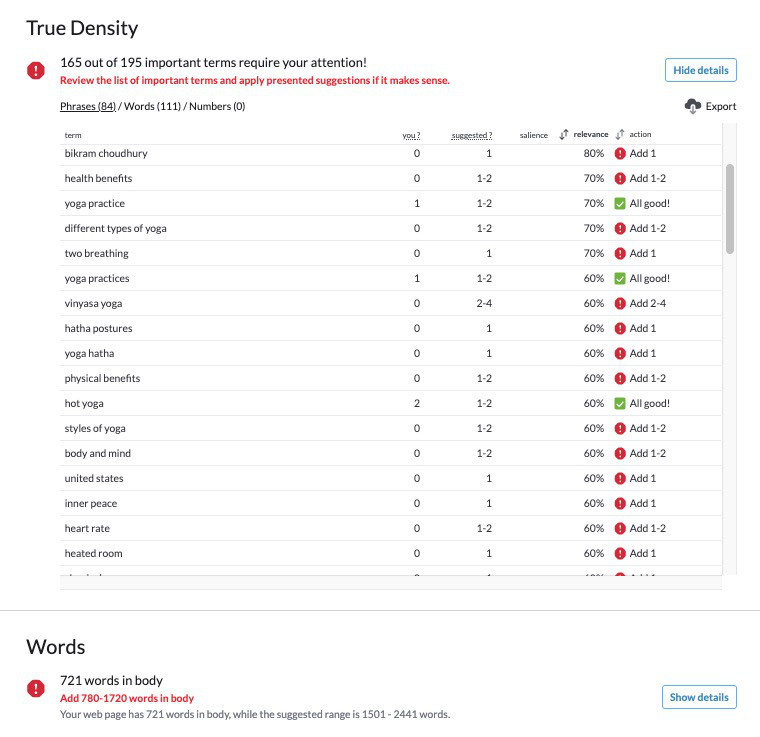Whether you've got a local yoga studio, run an e-commerce store, or produce an online yoga course, keyword research is essential for finding competitive topics, niches, services, and product descriptions to write about. In this blog post, I'm going to show you how to find great yoga-related keywords and also how to structure your content for maximum impact with your content marketing.
Find the best, juiciest topics to write about for content marketing, product descriptions, service offerings, and more.
Find the best, juiciest topics to write about for content marketing, product descriptions, service offerings, and more.
Why Keywords?
Billions of people use Google to find answers to their questions. These questions can be as simple as a couple of words typed into Google’s search box. An example is “yoga studio Sydney”. While this isn’t a real sentence or even a questions, search engines understand that the person typing these words is looking for a yoga studio in Sydney.
We call the words used keywords. Search engines match keywords with websites or web properties that best answer the user intent.
But how to find which keywords people are looking for? The easiest place to start is Google’s search itself. Start typing a phrase in the search bar and see what the autocomplete feature offers.
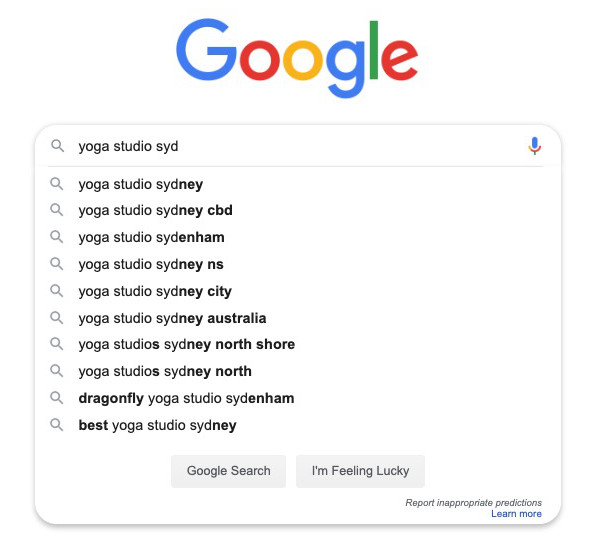
Once you’ve completed a search, look at the bottom of the page for “related terms”.

But it's not just a matter of finding phrases that people are actively searching for, it's also about finding low competition keywords or simply keywords that your website can rank for in Google. Otherwise, all that content might never be seen. The How To Find Yoga-related Keywords section describes the best tools for keyword research. But before that, let’s look at what makes good and bad keywords.
Examples of Bad Keywords
❌ Yoga
There is little point in trying to rank first in Google for this term. It's just too difficult. There's also little commercial value in being number one for this term if you own a local business or even a yoga e-commerce store.
❌ Yoga on Netflix
While this isn’t a particularly difficult keyword to rank for, Netflix will always have the top spot. And unless you make money from ads on your website, there’s little reason to go after a non-commercial keyword like this. Unless, of course, you want to add some new content to your website. But there’s a disconnect between visitors on your site and people wanting the best yoga shows on Netflix.
Examples of Good keywords
✅ Yoga for stress relief in [add your city, town, or location]
If you own or manage a local yoga studio, these kinds of long-tail phrases can be incredibly good for driving traffic to specialized classes.
✅ Best yoga pants for seniors
Yoga bloggers and even ecommerce store owners can make use of listicle-type posts to write about the best types of x for y. If you sell one type of yoga pants, write exactly why they are the best yoga pants for seniors. The public wants details and Google will send them to your content if it’s thoroughly explained.
Choosing keywords for your yoga business.
The keywords you choose will depend on the type of yoga business you run. I'll split these into four different areas:
Local Yoga Studio
Local businesses naturally depend on local related keywords such as
- Yoga studio in [your city]
- best yoga studio near me
- yoga classes on Sundays
- Yoga for beginners in [your city]
- different types of yoga and their benefits
- yoga classes [your city]
- yoga studio [your city]
- yoga for beginners near me
- local yoga classes for beginners
- prenatal yoga near me
- pregnancy yoga near me
- yoga [name of street] – get specific if your business is on an important road.
- strength-building yoga classes
- yoga for seniors classes
- yoga retreats in [your city, state, or country]
There are literally thousands of different variations on these keywords. An important point to remember: Don't create multiple pages with very similar keyboards. This may result in what we call keyword cannibalisation, where multiple pages rank for the same keyword and Google has a hard time understanding which pages should rank for which keywords. In the end, all pages languish outside the top 10. So, the rule is, avoid writing for the exact same topic over and over.
At the very start of your keyword research, outline the pages and blog posts that you want. You can expand on these later on, but it will not help to write two posts like this:
- The top 10 yoga studios in London
- The best yoga studio in London
These phrases are very similar. Combine similar phrases into one single blog post. This is a better strategy than writing two blog posts that target semantically similar phrases.
Yoga Ecommerce
Let's presume that your e-commerce store sells internationally. Keywords with a local focus (like the previous examples) are not important here, so focus on what we call buyer-intent keywords.
Some examples:
- best yoga mat for seniors
- bye yoga products online
- best value stretch bands
- yoga pants discount
- yoga dress pants ?think outside the box and get traffic from searches that are related to your products but not directly targeting them.
Most ecommerce stores can't completely rely on buyer intent keywords. However, there are other ways to get traffic. Content marketing is a great way to attract people to the top of the funnel. This is where people are in the research phase of the buyer journey. Good examples of content for this stage are product comparisons or product benefits posts. Product reviews can be great for finding people looking to learn about a potential purchase.
Another way to create valuable content for your yoga ecommerce website is to write informational posts. For example:
- The health benefits of yoga
- Yoga for back pain
- Yoga vs CrossFit
While these kinds of posts might not directly translate to sales. They help build trust with an audience. You can also try to capture email addresses with lead magnets. And you can tag visitors with a Facebook pixel in order to retarget these visitors later with Facebook Ads (at a much lower cost than advertising to cold audiences).
Online Yoga Course
With the rise of online education, online yoga courses are becoming popular. In fact, almost 2000 people a month search for “Online Yoga Course” in Google (not to mention the other search engines like YouTube, Bing, DuckDuckGo, and Yahoo)
But don't go rushing into trying to rank for that exact phrase if you are just starting your business or your domain is still relatively unknown. “Online Yoga Course” is a lucrative keyword which many other websites value. The competition for 1st place on Google is fierce.
Here are some examples of good keywords:
✅ yoga poses for beginners
✅ online yoga teacher training ?Note: this is a big market. According to Keysearch, there are 2,900 searches for this exact keyphrase alone every month worldwide. And it’s considered an easy keyword to rank for.
✅ different asanas of yoga and their benefits ?Note: while this is not directly related to an online course, it’s a good piece of content to grab attention. Content marketing works by creating trust through authority. Write the best blog post about the different asanas and you can expect lots of leads.
✅ hatha yoga class youtube ?Note:YouTube might not be your main platform but as the second biggest search engine in the world, it’s a powerful lead generation engine. If you can get people to watch your videos and subscribe to your channel, you can send them to your online yoga course site, website, or social media platforms.
Yoga Bloggers
Fitness bloggers can make money from affiliate commissions (referring visitors to products and getting a percentage of the sale value), from ads on their website, and from sponsored posts. The key to success is getting traffic to your website. And the better the quality of traffic, the more chances they have for monetization. The best audience to monetize is, generally speaking, the US market (especially when it comes to advertising revenue and affiliate marketing). Write for US audiences if you want to increase your earnings.
The following long-tail keyword phrases are good bases for articles that can drive a lot of traffic (based on the search volume metrics).
✅ Types of yoga and benefits
✅ Benefits of vinyasa yoga
✅ Yoga poses that make you poop ?Note: while this might seem a bit gross, people are actually looking for this keyword. Write the best answer on the internet and get traffic. A related term is “yoga positions for constipation”. Find other related terms using Surfer SEO.
✅ Yoga for CrossFitters
Business owners at the early stage of their website creation should focus on low competition keywords. And this brings me onto to the next topic how to find easy keywords.
How To Find Yoga-related Keywords
If you want to find literally millions of related keywords use the charmingly named keyword s****** .com.
Enter a phrase and watch as as as the words fly by. Many phrases in the produced list will be useless, but you will get plenty of ideas and have some good seed keywords to start with.
But there are more sophisticated tools than this. The best are paid subscription model software products. Prices range from the tens of dollars to hundreds a month.
Keyword Tools
Ranking keywords on Google get harder every year. There is more competition and even Google is taking some of the clicks away. best way to compete is to use a good keyword tool and the methodical in your blog post planning. it also pays to target the right keywords and make sure that the traffic you're driving to your website will either buy your products or services visit your store or linked to you.
One of the best keyword research tools is Keysearch. We've been using this tool for many years.
There are alternatives of course. Here are the best-known and most-respected keyword tools:
The first four are paid tools and they're all excellent at what they do. They are much more expensive than keysearch, however.
Ahrefs, for example, is an incredible tool for discovering backlinks and finding out what keywords a site or page ranks for. But the keyword difficulty metric is based on the number of links. And links are not the only factor that search engines consider when choosing which blog post to rank above others.
Ubersuggest is free and that might be as good a reason as any to use the tool. It's also got a nice user interface. But while this tool has a lot of nice features, the data are rarely as good as with the other tools. The keyword research results are often just plain wrong. It's a nice tool to have as a freebie but avoid using it as your main tool or you might end up wasting a lot of time.
The keyword difficulty metric is different for each tool and is determined by that tool's own ideas about “difficulty”. Google plays no part in this and doesn't care about difficulty metrics. However, these tools are sophisticated enough to understand the competitive field based on the following criteria and more.
- the number of backlinks to the top blog posts
- the number of backlinks to the top ranking websites
- the quality of the current ranking content
- the length of the blog posts
- the age of the content and the age of the website.
Using Keysearch
Our weapon of choice for detailed keyword analysis has a ton of features (too many to list here) but I'll explain how to get started with the tool.
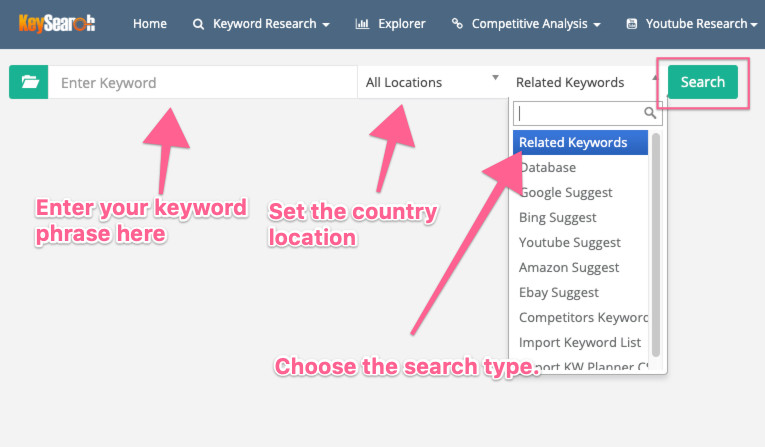
Open up the app and enter your topic, phrase, or keyword in the first box.
If you want to search in a particular country you can do so with a drop-down menu.
Leaving the default search method as “Related Keywords” will return up to 700 words and phrases related to your seed keywords.
Here's an example screenshot of the results from a search for “Types of yoga and benefits” in the United Kingdom.
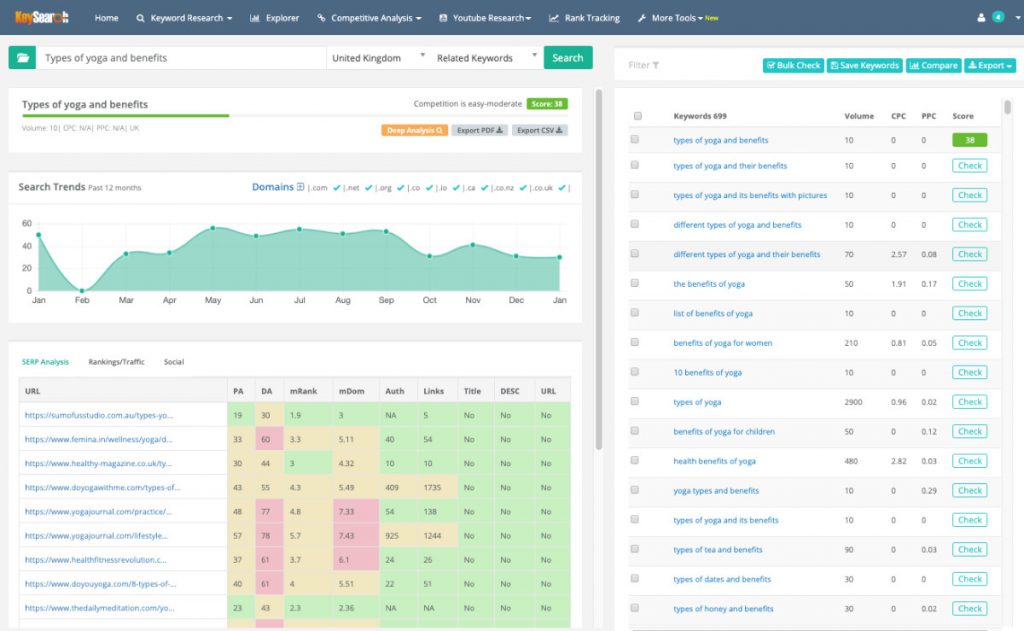
And here each section is broken down.
Seasonal trends:

Currently ranking URLs and their domain strengths (great for analyzing the competitiveness):
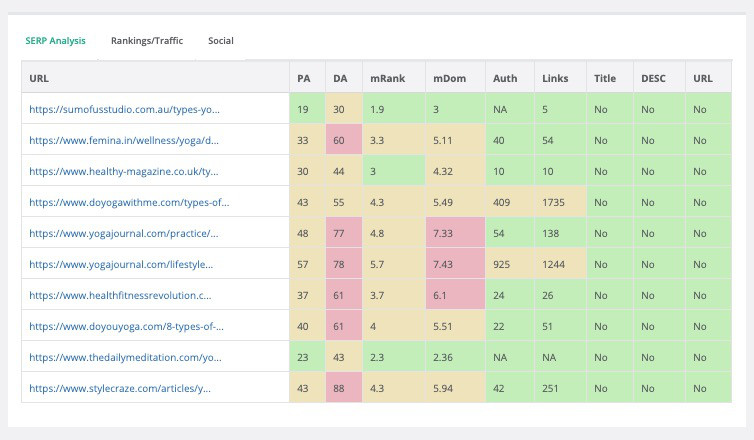
Check any keywords for its score (difficulty metric: the lower the score, the easier it is):
But you can also narrow down the search to specific terms, volumes, number of words, score, and CPC (cost per click) by using filters. You can even add negative words to the filter.
Click the filter button near the top right and add your filters.
Once you've narrowed down your search, select all remaining words and click Bulk Check to quickly check the scores of the words.
Read This Review Of Keysearch
Content Marketing and Content Writing Tools
Content marketing is the act of creating awareness for your brand through helpful blog or social media posts. These posts do not have to have the sole purpose of selling your product or service; They can be about topics related to your niche.
The fact is that it’s not much use having great yoga keywords if you can’t use them. And using them incorrectly is almost as bad as not at all. So how do we make the most out of the keywords you’ve found? By creating the best, most thorough content on the internet around a topic. An important point here is that to be thorough in the eyes of Google, it’s necessary to include every related topic that Google deems necessary. But how can you know this?
Check out our guide to the Best Content Writing Tools for Higher Rankings
Well there are a couple of ways to do it
- Read every blog post in the top 10-20 results on Google, noting every major topic, headline and phrase. Collate the topics into a spreadsheet and begin creating an outline
- Use Surfer SEO to find all of the relevant words and phrase to include. Surfer saves you tons of time by not only outlining the content but it also provides word count recommendations and will audit your blog post once it’s live. You can even compose your content inside of Surfer where the software can make recommendations as you write.
Here's a small section of the result of an audit analysis of our favourite yoga topic in the app. I audited a blog post that is ranking in position 9 in Google to see where it could be improved.
The tool recommends adding between 780 and 1720 words to the content. It also suggests the number of instances of words and phrases that should be added and removed from the content. This is invaluable information for anyone looking to improve their content and outsmart their competitors.
Obviously, Surfer SEO is not a required tool for keyword research and it comes with a monthly cost, but it will save you a ton of time.
By using the methods above with Keysearch and Surfer SEO, you can easily find great keywords for your yoga website and dominate your niche.




